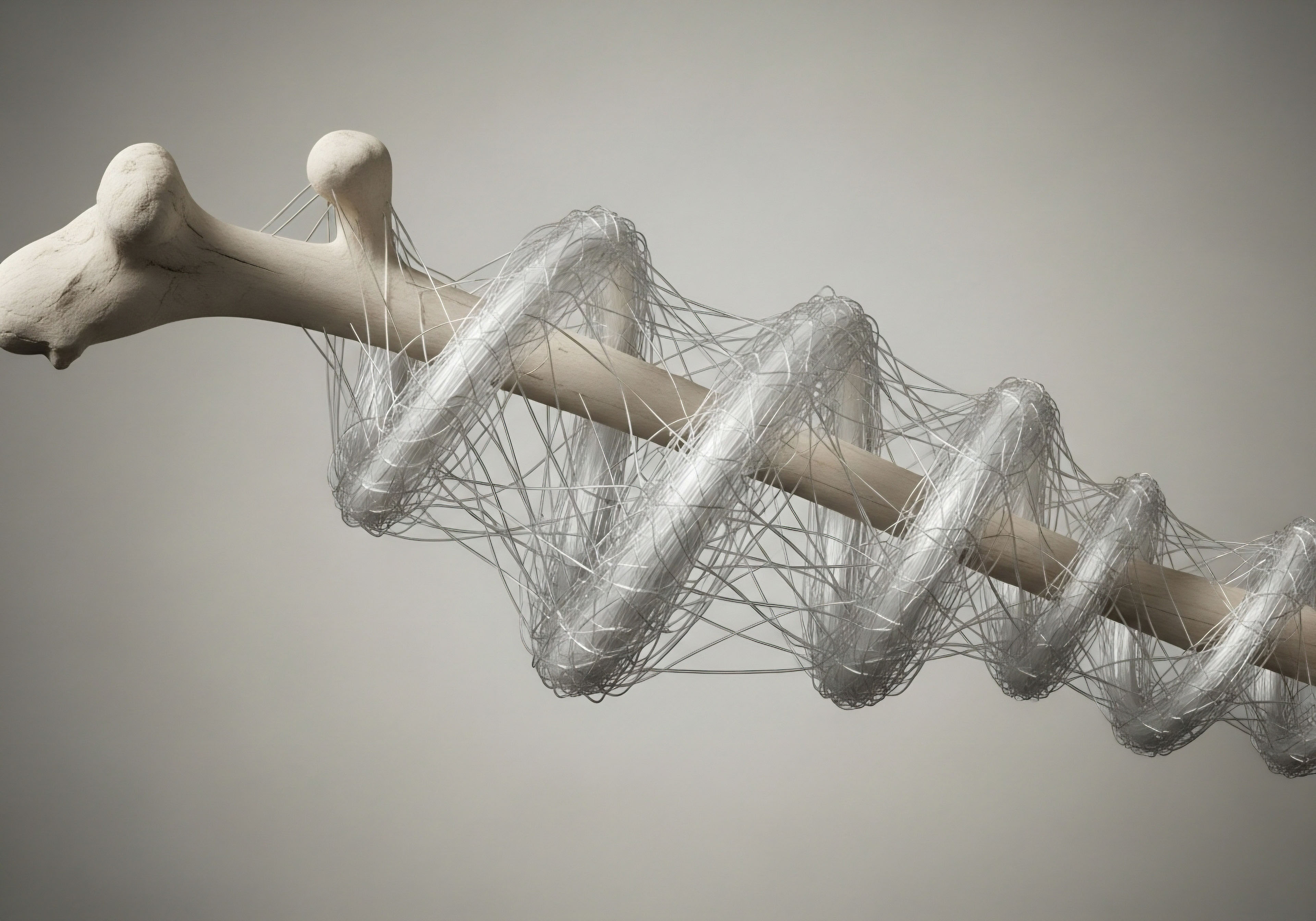

Fundamentals
You may have noticed a shift in your mental clarity. Words that were once readily available now seem distant, focus feels fragmented, and a persistent sense of ‘brain fog’ clouds your daily functions. These experiences are valid. They are significant data points, your body’s method of communicating a profound change within its intricate internal communication network.
This network, the endocrine system, relies on chemical messengers called hormones to transmit vital instructions throughout your body, and the brain is a primary recipient of these signals. Understanding this relationship is the first step toward reclaiming your cognitive vitality.
The brain is densely populated with receptors for sex hormones like testosterone and estrogen. These hormones are powerful metabolic regulators that also govern reproduction. Their presence is fundamental to the brain’s structural integrity and operational efficiency. They support the growth of neurons, the formation of new connections (synapses), and the protection of existing neural tissue from damage. This protective function, known as neuroprotection, is a continuous process that helps maintain cognitive resilience against the effects of aging and environmental stressors.
Hormonal fluctuations directly impact the brain’s ability to process information, regulate mood, and maintain memory.

The Brain’s Chemical Architecture
Your cognitive function depends on a delicate biochemical balance. Hormones act as conductors of this complex orchestra, ensuring that neurotransmitters ∞ the brain’s more immediate messengers like serotonin and dopamine ∞ are produced and regulated effectively. When hormonal levels decline or become erratic, as they do during andropause for men or perimenopause and menopause for women, this entire system is disrupted. The consequences extend beyond mood swings or hot flashes; they manifest as tangible changes in your cognitive performance.

Testosterone and Cognitive Endurance
In the male brain, testosterone is a key modulator of mental stamina and spatial reasoning. It contributes to the maintenance of myelin, the protective sheath around nerve fibers that ensures rapid and efficient communication between brain cells. A decline in testosterone can correspond with a noticeable decrease in mental sharpness, focus, and problem-solving abilities. This is a biological reality, a direct consequence of reduced hormonal support for critical neural pathways.

Estrogen and Progesterone the Female Cognitive Keystone
For women, estrogen is a master regulator of brain energy metabolism, promoting glucose uptake and utilization by neurons. It also enhances blood flow within the brain, ensuring that neural tissues receive the oxygen and nutrients they need to function optimally.
Progesterone, often working in concert with estrogen, has a calming effect on the brain, partly through its conversion to a metabolite called allopregnanolone, which helps modulate the nervous system’s response to stress. The decline of these two hormones during menopause can lead to significant cognitive symptoms, including memory lapses and difficulty with multitasking, because the brain’s very infrastructure is undergoing a fundamental shift.
Recognizing that these symptoms are rooted in physiological changes is empowering. It moves the conversation from one of passive acceptance to one of active inquiry. Your brain is not failing; it is adapting to a new hormonal environment. The question then becomes how to best support it through this transition.


Intermediate
Understanding the connection between hormones and brain health naturally leads to a critical question What can be done to support cognitive function when these chemical messengers decline? Hormonal interventions, when thoughtfully applied, are designed to restore the biochemical environment in which the brain can operate efficiently.
These protocols are not about creating unnaturally high levels of hormones; they are about re-establishing a physiological balance that supports neural integrity and function. Each intervention is tailored to the individual’s unique biochemistry, symptoms, and health goals.

Targeted Protocols for Cognitive Restoration
The clinical approach to hormonal optimization for brain health is precise. It involves using bioidentical hormones and other targeted therapies to address specific deficiencies and support the systems that underpin cognitive performance. The goal is to provide the brain with the resources it needs to maintain its plasticity, protect itself from degradation, and sustain high-level executive functions.

Testosterone Replacement Therapy for Men
For men experiencing the cognitive symptoms of andropause, such as diminished focus and memory, Testosterone Replacement Therapy (TRT) can be a powerful intervention. The standard protocol often involves weekly intramuscular or subcutaneous injections of Testosterone Cypionate. This regimen is designed to restore testosterone levels to an optimal physiological range, providing consistent support for the brain.
Studies have shown that TRT can lead to measurable improvements in specific cognitive domains. Men undergoing therapy often report enhanced mental clarity, sharper focus, and improved spatial and verbal memory. To ensure a balanced approach, TRT protocols frequently include ancillary medications:
- Gonadorelin A medication used to stimulate the pituitary gland, helping to maintain the body’s own natural testosterone production cycle. This supports the entire Hypothalamic-Pituitary-Gonadal (HPG) axis.
- Anastrozole An aromatase inhibitor that carefully manages the conversion of testosterone to estrogen, preventing potential side effects and maintaining a healthy hormonal ratio.
Optimizing hormone levels provides the brain with the necessary tools to repair damage and maintain functional connectivity.

Hormone Therapy for Women a Matter of Timing and Type
For women, the approach to hormonal intervention is nuanced, with significant emphasis placed on the type of hormone used and the timing of the therapy. Research strongly supports the “critical window” hypothesis, which suggests that initiating estrogen therapy during perimenopause or early post-menopause provides the greatest neuroprotective benefits. Starting therapy during this period appears to help preserve brain structure and function, potentially lowering the long-term risk of cognitive decline.
Protocols for women are highly personalized and may include:
- Low-Dose Testosterone Administered via subcutaneous injection, testosterone in women can significantly improve mental clarity, focus, and libido, addressing symptoms that estrogen alone may not resolve.
- Bioidentical Progesterone Crucial for balancing the effects of estrogen, progesterone also has independent neuroprotective qualities. It is known to promote myelination, the repair of the nerve-insulating sheath, and has calming, anti-anxiety effects.
The choice between different delivery methods, such as injections, pellets, or creams, is made based on individual needs and metabolic responses, ensuring a steady and predictable supply of hormones to the brain and body.
| Intervention | Primary Target Audience | Key Cognitive Benefits | Common Protocol Components |
|---|---|---|---|
| Male TRT | Men with low testosterone | Improved focus, memory, spatial reasoning | Testosterone Cypionate, Gonadorelin, Anastrozole |
| Female HRT | Peri/Post-menopausal women | Enhanced memory, mood stability, reduced brain fog | Estradiol, Progesterone, Low-Dose Testosterone |
| Peptide Therapy | Adults seeking anti-aging/cognitive enhancement | Increased mental acuity, improved sleep, neurogenesis | Sermorelin, Ipamorelin, CJC-1295 |

Growth Hormone Peptide Therapy a Frontier in Cognitive Enhancement
Beyond traditional hormone replacement, Growth Hormone Peptide Therapy represents an advanced approach to supporting long-term brain health. Peptides like Sermorelin and Ipamorelin are not hormones themselves; they are signaling molecules that stimulate the pituitary gland to produce and release the body’s own growth hormone (GH). This process is critical for cellular regeneration throughout the body, including the brain.
Elevated GH levels are associated with several cognitive benefits:
- Neurogenesis GH promotes the growth of new neurons, a fundamental aspect of brain plasticity and learning.
- Improved Sleep Quality These peptides can restore deep, restorative sleep cycles, which are essential for memory consolidation and clearing metabolic waste from the brain.
- Enhanced Mental Acuity By supporting neuronal health and reducing inflammation, peptide therapy can lead to sharper cognitive function and overall mental clarity.
The use of peptides like Sermorelin and Ipamorelin, often in combination, provides a pulsatile release of GH that mimics the body’s natural rhythms, offering a sophisticated method for maintaining a youthful cognitive environment.


Academic
A deeper examination of hormonal interventions on brain health requires moving from physiological observation to molecular mechanisms. The long-term cognitive integrity of an individual is intrinsically linked to the inflammatory state of the central nervous system and the efficiency of its synaptic architecture.
Hormones such as testosterone, estrogen, and progesterone, along with growth hormone, are not merely passive participants; they are potent modulators of these foundational neurological processes. Their decline with age contributes to a pro-inflammatory state and diminished synaptic plasticity, creating a permissive environment for neurodegenerative processes.

Modulating Neuroinflammation and Synaptic Plasticity
Neuroinflammation, a sustained immune response within the brain, is a key pathological driver in age-related cognitive decline. Hormonal therapies exert a direct influence on this process. For instance, testosterone has been demonstrated to have anti-inflammatory properties within the brain, helping to suppress the activation of microglia, the brain’s resident immune cells. By mitigating chronic microglial activation, testosterone helps protect neurons from the cytotoxic environment that characterizes neuroinflammation.
Estrogen plays a similarly vital role. It supports neuronal survival and function through multiple pathways. It upregulates the production of brain-derived neurotrophic factor (BDNF), a protein essential for synaptic plasticity, learning, and memory. Estrogen also enhances cerebral blood flow and glucose transport, ensuring neurons have the metabolic resources for optimal function. Clinical studies investigating the “critical window” for estrogen therapy suggest its neuroprotective efficacy is maximal when initiated before significant neuronal damage has occurred, highlighting its preventative capacity.
Hormonal interventions function at a cellular level to counteract neuroinflammation and preserve the brain’s intricate synaptic network.

The Neurosteroid Axis Progesterone’s Role in Myelin Repair
Progesterone’s contribution to brain health extends beyond its interaction with estrogen. Within the brain, progesterone is metabolized into allopregnanolone, a powerful neurosteroid. Allopregnanolone is a positive allosteric modulator of the GABA-A receptor, which explains its anxiolytic and calming effects. Its most critical function may be its role in myelination. Myelin is the fatty sheath that insulates nerve axons, enabling rapid electrical signaling. Damage to myelin disrupts neural communication, a hallmark of several neurodegenerative diseases.
Progesterone has been shown to promote the differentiation of oligodendrocyte precursor cells into mature, myelin-producing oligodendrocytes. This action facilitates the repair and maintenance of myelin sheaths, preserving the structural integrity of the brain’s white matter and ensuring efficient cognitive processing. This makes progesterone a key agent in maintaining the brain’s functional architecture over the long term.
| Hormone/Peptide | Primary Molecular Mechanism | Resulting Neurological Benefit |
|---|---|---|
| Testosterone | Suppression of microglial activation | Reduction of chronic neuroinflammation |
| Estrogen | Upregulation of BDNF and enhanced cerebral blood flow | Increased synaptic plasticity and neuronal energy supply |
| Progesterone | Promotion of oligodendrocyte differentiation | Maintenance and repair of myelin sheath |
| Growth Hormone (via Peptides) | Stimulation of neurogenesis and IGF-1 signaling | Enhanced neuronal regeneration and synaptic function |

What Are the Long Term Risks of Continuous Hormonal Therapy?
The discourse on hormonal interventions must include a rigorous assessment of long-term data. While many studies demonstrate cognitive benefits, particularly with testosterone and appropriately timed estrogen therapy, some large-scale observational studies have raised questions about a potential increased risk of dementia with certain long-term combined estrogen-progestin therapies initiated late in post-menopause.
These conflicting findings underscore the complexity of hormonal action in the brain. The type of hormone (e.g. bioidentical versus synthetic progestins), the route of administration, the timing of initiation, and the individual’s genetic background are all critical variables that influence outcomes. This complexity reinforces the necessity of a personalized clinical approach, where protocols are continuously monitored and adjusted based on both subjective feedback and objective biomarker data.

How Do Growth Hormone Peptides Affect the Aging Brain?
Growth hormone peptide therapies, such as those using Sermorelin and Ipamorelin, offer a distinct mechanistic pathway. By stimulating the endogenous, pulsatile release of growth hormone, these peptides increase levels of Insulin-like Growth Factor 1 (IGF-1) in the brain. IGF-1 is a powerful neurotrophic factor that supports neuronal survival, synaptic health, and cognitive function.
The advantage of this approach is that it avoids the continuous, non-physiological stimulation associated with direct GH administration, potentially offering a more favorable safety profile while still promoting a regenerative neural environment. This makes peptide therapy a sophisticated tool for long-term cognitive preservation.

References
- Brinton, R. D. “Estrogen and neuroprotection ∞ from clinical observations to molecular mechanisms.” Journal of the American Geriatrics Society, vol. 49, no. 10, 2001, pp. 1389-1402.
- Cherrier, M. M. et al. “Testosterone supplementation improves spatial and verbal memory in healthy older men.” Neurology, vol. 57, no. 1, 2001, pp. 80-88.
- Resnick, S. M. and Henderson, V. W. “Hormone therapy and risk of developing dementia.” JAMA, vol. 288, no. 17, 2002, pp. 2170-2172.
- Schumacher, M. et al. “Progesterone in the brain ∞ hormone, neurosteroid and neuroprotectant.” Endocrine Reviews, vol. 35, no. 2, 2014, pp. 219-251.
- Genazzani, A. R. et al. “Progesterone, progestagens and the central nervous system.” Human Reproduction, vol. 15, no. suppl_1, 2000, pp. 14-27.
- Grasso, C. et al. “Effect of Testosterone Replacement Therapy on Cognitive Performance and Depression in Men with Testosterone Deficiency Syndrome.” World Journal of Men’s Health, vol. 32, no. 2, 2014, pp. 95-102.
- Worly, B. L. et al. “The effects of testosterone on cognition in men ∞ a review.” The Journal of Sexual Medicine, vol. 15, no. 11, 2018, pp. 1547-1557.
- Daniel, J. M. “Estrogen, the hippocampus and memory ∞ a critical review.” Behavioural Brain Research, vol. 173, no. 1, 2006, pp. 1-17.
- Nyberg, F. “Growth hormone in the brain ∞ characteristics of specific brain targets for the hormone and their functional significance.” Frontiers in Neuroendocrinology, vol. 26, no. 1, 2005, pp. 2-27.
- Pourhadi, N. et al. “Menopausal hormone therapy and dementia ∞ nationwide, nested case-control study.” BMJ, vol. 381, 2023, e072780.

Reflection
You have now explored the intricate biological systems that connect your hormonal state to your cognitive world. This knowledge serves a distinct purpose to reframe your personal experience within a scientific context, transforming feelings of uncertainty into a foundation for informed action. The sensations of brain fog or memory lapses are not personal failings; they are signals from a complex system undergoing a predictable, manageable transition. Your biology is communicating a need for different support.
This understanding is the starting point of a more intentional relationship with your own health. The path forward involves seeing your body as a dynamic system, one that you can learn to interpret and modulate in partnership with skilled clinical guidance.
The data you hold ∞ your symptoms, your lab results, your lived experience ∞ is the most valuable asset in constructing a wellness protocol that is yours alone. The potential for sustained cognitive vitality does not reside in a single solution, but in a continuous, proactive process of listening to your body and responding with precise, evidence-based care.



